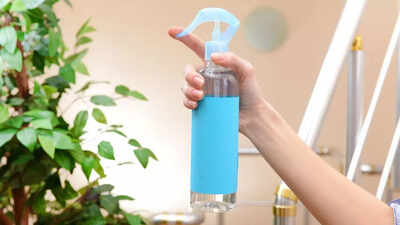Air fresheners are a go-to solution for many households to keep their homes smelling fresh. But what you may not realise is that many of these products release harmful chemicals that can affect your health over time. From irritating your lungs to disrupting your hormones, the impact of regular use may be more serious than you think, especially for children, pets, and those with respiratory issues. Here are seven reasons why you may want to rethink using air fresheners in your living space.
6 hidden dangers of air fresheners every household should be aware of
They release harmful volatile organic compounds (VOCs)
Air fresheners often contain volatile organic compounds (VOCs), which are chemicals that quickly evaporate into the air to create fragrance. While they make your home smell nice, VOCs like acetone, ethanol, and limonene can irritate your eyes, throat, and lungs. Long-term exposure has been linked to liver and kidney damage, and in some cases, even cancer. When these VOCs react with air, they may also form formaldehyde—a known carcinogen. Using them daily, especially in small or poorly ventilated spaces, significantly increases indoor toxin levels, making the air you breathe far more harmful over time. Poor ventilation can make the effects even worse.
They may contain hormone-disrupting phthalates
Phthalates are added to many fragranced products to help the scent last longer, but they come with health concerns. These chemicals are known endocrine disruptors, meaning they can interfere with your hormones. Regular exposure may affect reproductive health, especially in pregnant women and young children. Even products labelled “natural” or “unscented” may still contain phthalates, which are released into the air and inhaled with every use.
They can trigger breathing problems and asthma
People with asthma or other breathing issues may find that air fresheners make their symptoms worse. The fragrances and chemicals used can irritate the lungs, causing coughing, wheezing, or shortness of breath. Research has shown that even low levels of exposure can increase the risk of asthma in both children and adults. If you notice breathing difficulties after using air fresheners, it could be a sign of sensitivity to these airborne chemicals.
They contribute to indoor air pollution
Many people are aware of outdoor air pollution, but indoor pollution can be just as dangerous. Air fresheners contribute significantly by releasing toxins like benzene, toluene, and formaldehyde into your living space. These chemicals don’t just disappear—they stay in the air and build up, especially if your home isn’t well-ventilated. Breathing this polluted air daily can affect your long-term respiratory health.
They can harm pets
Your furry friends are more sensitive to airborne chemicals than you might think. Dogs, cats, and especially birds can react negatively to the compounds found in air fresheners. Pets may experience symptoms like sneezing, coughing, skin irritation, or even behavioural changes. Birds are particularly vulnerable and may develop serious breathing issues from even a small amount of exposure. If you have pets, using air fresheners could be putting their health at risk.
They mask odours instead of removing them
Air fresheners don’t eliminate bad smells; they just cover them up. The source of odours such as mould, smoke, or pet mess remains in your home, continuing to affect air quality. Over time, this can lead to health issues, especially if the root cause involves dampness or bacteria. Rather than masking unpleasant smells, it’s better to tackle the source and improve ventilation for lasting freshness.If you want a fresh-smelling home without the risks, there are plenty of healthier options. Essential oil diffusers using natural oils like lavender or eucalyptus can add pleasant scents without chemicals. Baking soda or vinegar bowls can absorb odours naturally. Beeswax candles, homemade sprays with water and essential oils, or even indoor plants like peace lilies can purify the air safely. These options are better for your health, and just as effective.While air fresheners may offer a temporary solution for bad smells, they come with hidden health risks. The chemicals they release can affect everything from your hormones to your lungs and may even impact your pets. Making the switch to natural alternatives is a simple but powerful step to improve your indoor air quality and protect your family’s well-being. A clean home should not come at the cost of your health.Also Read: Don’t let the heavy rain wreck your home interiors: 5 monsoon damage signs to watch out for






